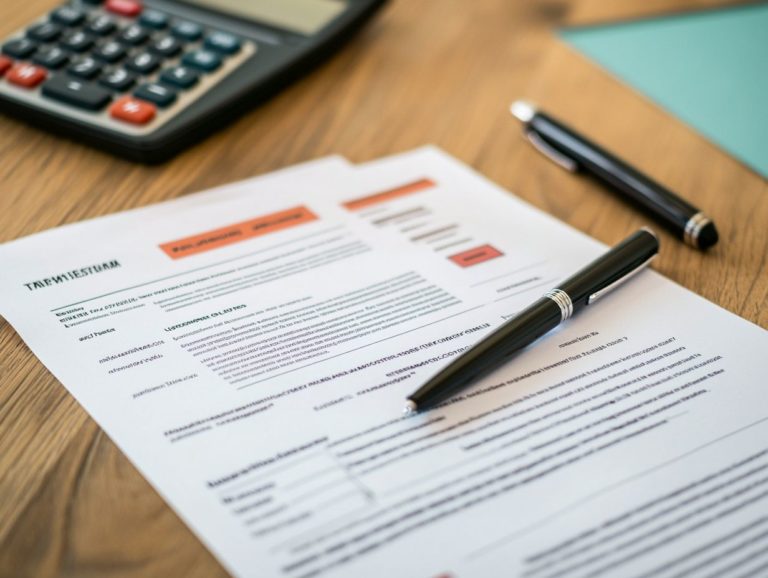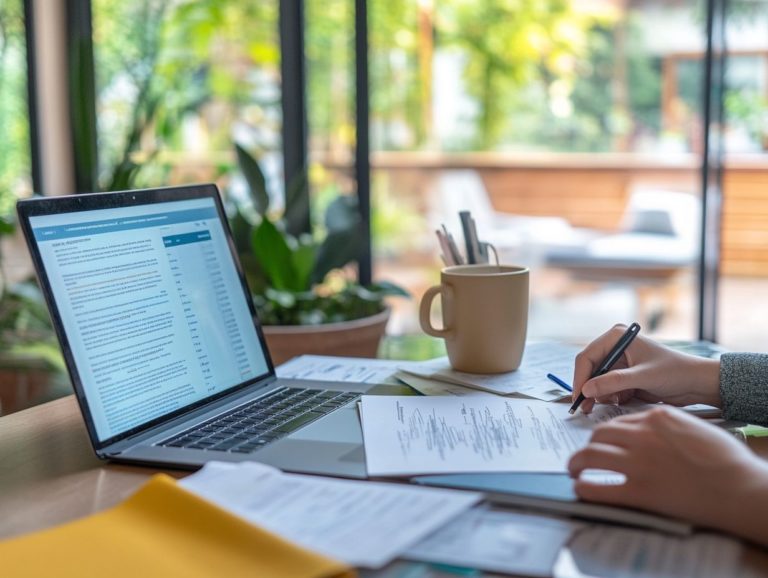5 Steps to Take After Mortgage Approval
Navigating the home-buying process can be both exhilarating and daunting, especially once you’ve received your mortgage approval. So, what comes next? This guide will walk you through the essential steps to take after approval. From reviewing your mortgage approval letter and shopping for homeowner’s insurance to preparing for closing day, each step plays a vital role in ensuring a smooth move into your new home.
You’ll find answers to common questions about the necessary documents, final inspections, and what to expect on closing day. Join in as you embark on this journey ahead!
Contents
- Key Takeaways:
- 1. Review Your Mortgage Approval Letter
- 2. Start Shopping for Homeowner’s Insurance
- 3. Gather Necessary Documents for Closing
- 4. Complete a Final Walk-Through of the Property
- 5. Prepare for Closing Day
- What Does Mortgage Approval Mean?
- Frequently Asked Questions
- What should I do after receiving mortgage approval?
- What is the first step to take after mortgage approval?
- Do I need to secure homeowner insurance after mortgage approval?
- What Documents Are Needed for Closing?
- What Should Be Checked During the Final Walk-Through?
- What Happens on Closing Day?
- What Should Be Done After Closing?
- Should I start house hunting after mortgage approval?
- What is the next step after finding a home?
- Do I need to prepare for the closing process after mortgage approval?
Key Takeaways:
Dive into your mortgage approval letter to unlock essential insights!
Shop around for homeowner’s insurance to protect your investment and meet lender requirements.
Gather your documents now to ensure a smooth closing!
1. Review Your Mortgage Approval Letter
Your mortgage approval letter outlines your eligibility and terms. It gives you insights into your readiness as a borrower.
This letter confirms your loan amount, reflects your credit score, and details the required down payment. Understanding these components is vital as they influence your monthly payments and overall financial strategy.
Being well-versed in these terms gives you the power to strategize effectively and enhances your purchasing power during negotiations with sellers.
The significance of credit scores cannot be overstated they directly impact the interest rate you’ll be offered. Down payment requirements, often a percentage of the home’s price, determine how much you’ll need upfront, allowing you to move forward confidently in your home-buying journey.
2. Start Shopping for Homeowner’s Insurance
As you finalize your mortgage, it’s time to explore homeowner’s insurance to protect your exciting new investment!
This insurance can vary greatly and covers aspects like dwelling protection, personal property, liability, and even additional living expenses. Each type serves a crucial purpose in safeguarding your home and belongings.
It’s crucial to compare rates from different providers not only for potential cost savings but also to evaluate the depth of coverage available. In some cases, mortgage lenders might require specific coverage types, so clarify these requirements early on.
To secure the best policy, assess the limits of each option, review the exclusions and conditions meticulously, and ask pointed questions to clear up any uncertainties.
3. Gather Necessary Documents for Closing
Gather your documents now to ensure a smooth closing!
This crucial step involves compiling financial documents that verify your eligibility and finalize mortgage details with your lender.
As a prospective homeowner, you’ll need to present key paperwork, such as proof of income recent pay stubs or tax returns along with bank statements showcasing your financial stability.
Valid identification is also critical for security and verification during the closing process. Your real estate agent will be instrumental in guiding you through this intricate documentation phase.
Their expertise can demystify how each document affects closing costs and timelines, ensuring that everything progresses smoothly for everyone involved.
4. Complete a Final Walk-Through of the Property
Completing a final walk-through of the property is a crucial step in your home buying journey. This process allows you to confirm that the home meets the agreed-upon conditions before closing the deal. It safeguards your investment as a borrower.
During this important inspection, check off any repairs outlined in the home inspection report or appraisal. These repairs can significantly affect the property’s overall integrity. Beyond noting cosmetic issues, ensure that all agreed-upon conditions are met whether fixing leaks, updating electrical systems, or ensuring appliances work properly.
Your attention to detail in this process can greatly enhance your satisfaction as a homeowner. Imagine moving into a home that perfectly matches your dreams fewer headaches and surprises await!
5. Prepare for Closing Day
Preparing for closing day marks a pivotal milestone in your home buying journey. This phase involves finalizing mortgage details, settling closing costs, and ensuring that all parties are aligned for the transfer of ownership.
To navigate this crucial stage effectively, take several preparatory steps:
- First, confirming your financial arrangements is paramount. Verify the down payment amount, understand the final closing costs, and ensure you have sufficient funds ready.
- Next, reviewing all important documents is crucial. Carefully examine the buyer’s and seller’s disclosures, the loan estimate, and the closing disclosure. Gaining a clear understanding of what to expect during the closing process will help alleviate any anxieties you may have.
- Recognize how earnest money plays a role in this final stage. Earnest money is a deposit that shows you’re serious about buying a property and can influence negotiations and the overall timeline.
What Does Mortgage Approval Mean?
Mortgage approval signifies that a lender has thoroughly evaluated your financial situation. This evaluation considers essential factors like your credit score, income, and the amount of your monthly debt payments compared to your income.
This assessment determines how much you can borrow and the terms of your loan. Credit scores play a central role in assessing risk. A higher score increases your chances of securing lower interest rates and favorable terms, while a lower score may limit your options.
You ll need to gather various financial documents think tax returns, bank statements, and pay stubs to support your claims.
Once approved, you ll face a range of loan options, including fixed-rate and adjustable-rate mortgages. Each comes with its own set of conditions, significantly influencing your long-term financial health and overall homeownership experience.
What Are the Different Types of Homeowner’s Insurance?
Understanding the different types of homeowner’s insurance is crucial for protecting your property and meeting your mortgage lender’s requirements. These policies can vary significantly in coverage and premiums.
For example, the HO-1 policy provides basic coverage for specific perils, while the HO-2 offers broader protection against more risks, making it a more appealing option for many homeowners.
The popular HO-3 policy delivers comprehensive protection for both the structure and personal belongings, with only a few exclusions. This is essential for most mortgage lenders seeking robust coverage.
Beyond these standard options, specialized coverage like HO-5 and various endorsements can cater to unique needs, potentially enhancing your chances of approval for financing.
Choosing the right policy not only protects your assets but also aligns with lender expectations, paving a smoother path to homeownership.
Frequently Asked Questions
What should I do after receiving mortgage approval?
After receiving mortgage approval, there are five steps to take before applying for a mortgage. These steps will help ensure a smooth process towards homeownership.
What is the first step to take after mortgage approval?
The first step is to confirm the terms of your mortgage offer. Review the interest rate, closing costs, and any other fees associated with the loan.
Do I need to secure homeowner insurance after mortgage approval?
Yes, it is important to secure homeowner insurance before finalizing your mortgage. This will protect your investment from any unforeseen circumstances.
What Documents Are Needed for Closing?
The documents needed for closing are vital for finalizing your mortgage arrangement. They ensure that all necessary financial paperwork is meticulously organized for a seamless transition into homeownership.
Among these essential documents, the closing disclosure stands out. It provides a comprehensive breakdown of the loan terms, costs, and final figures, allowing you to review and verify your mortgage terms before you sign.
Proof of homeowner insurance is equally important. It protects your property against unforeseen damages and reassures lenders that their investment is secure.
Additionally, various forms of identification, such as a government-issued ID, are required. This confirms the identity of all parties involved, safeguarding the integrity of the transaction.
Together, these documents create a transparent and legally sound closing process. They set you up for success in your new home.
What Should Be Checked During the Final Walk-Through?
During your final walk-through, it’s crucial to ensure the property is in satisfactory condition. Take the time to double-check that any agreed-upon repairs from the home inspection have been completed.
Pay close attention to the major systems, such as heating, ventilation, and air conditioning (HVAC), plumbing, and electrical. Confirm that everything is functioning properly and meets your standards as a homeowner.
Discovering any unforeseen repairs that weren t previously discussed can significantly impact your peace of mind. Evaluating the overall cleanliness and presentation of the property can provide valuable insights into its maintenance.
This inspection is crucial and can save you from future headaches. Any unresolved issues could lead to delays or negotiations for concessions, highlighting the importance of this final check.
What Happens on Closing Day?
On closing day, you will find yourself at the table with the borrower, lender, and real estate professionals. Everyone is there to finalize the mortgage transaction.
You will sign documents that transfer ownership and settle any closing costs necessary to complete the process. This is a big day after months of work and discussions.
It’s essential for you and the other parties involved to arrive with all the necessary identification and documents to ensure everything goes smoothly.
After the initial introductions and verification of identities, the title company steps in. They facilitate the signing of various legal documents, such as the deed and mortgage agreement.
Once all paperwork is in order, funds for the sale are transferred. This is often done using secure electronic methods to protect both you and the seller.
Closing day isn t just about changing ownership; it represents the beginning of a new chapter filled with opportunities and responsibilities.
What Should Be Done After Closing?
After closing, it’s essential for you to take key steps toward homeownership. Set up your mortgage payments, ensure your homeowner insurance is active, and understand your property tax obligations.
Organize your financial records related to the property. This includes closing documents and any expenses incurred during the purchase.
You should also familiarize yourself with ongoing costs like property taxes and mortgage insurance. These will play a significant role in your long-term financial planning.
Keep track of maintenance expenses and budget for any unexpected repairs. This will shield you from future financial strain.
By being proactive in these areas, you can navigate the responsibilities of homeownership with greater confidence and ease.
Should I start house hunting after mortgage approval?
Start house hunting after getting your mortgage approved. You’ll understand what homes fit your budget, making the process smoother.
What is the next step after finding a home?
Schedule a home inspection. This crucial step reveals any hidden issues, ensuring you make a smart investment!
Do I need to prepare for the closing process after mortgage approval?
Yes, prepare for the closing process. Collect important papers like proof of income and ID, and ensure you have enough funds for closing costs.





